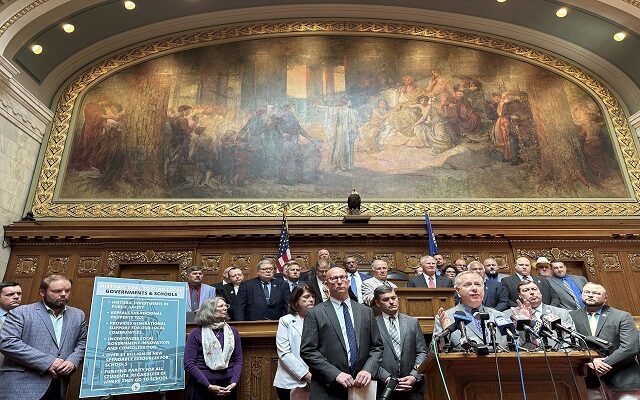Bipartisan deal reached to save Milwaukee from bankruptcy

By SCOTT BAUER Associated Press
MADISON, Wis. (AP) — Wisconsin has handed cash-strapped Milwaukee a lifeline to stave off bankruptcy, allowing the city to raise sales taxes without voter approval as part of a larger local government and K-12 schools funding plan, according to a bipartisan deal announced Thursday Democratic Gov. Tony Evers and Republican lawmakers.
Evers called it a “transformative” deal that will rescue Milwaukee from the threat of bankruptcy, “something that would have devastating consequences for communities in every corner of our state and our state economy as a whole.”
As part of the deal, the GOP-controlled Legislature agreed to spending an additional $1 billion on K-12 schools, along with increasing payments to families whose children attend taxpayer-funded private voucher schools. Evers, a former state superintendent of education in the first year of his second term as governor, has made spending more on education a cornerstone of his time in office.
The much-discussed local government funding plan has taken on urgency in the Legislature this year. Milwaukee officials have warned about dire consequences and deep cuts as the city faces bankruptcy by 2025. Milwaukee Mayor Cavalier Johnson warned lawmakers of “catastrophic budget cuts” if a deal for more funding wasn’t reached.
Milwaukee, the state’s largest city and a Democratic stronghold, faces an underfunded pension system. Milwaukee has increasingly become reliant on federal pandemic aid to fund its essential services, which city leaders have said cost $150 million more per year to maintain.
The largest sticking point in reaching a new funding deal had been who would determine whether Milwaukee city and county can raise the local sales tax to pay for pension costs and emergency services.
Milwaukee officials, Senate Republicans and Evers wanted the decision to rest with local governing boards. But Assembly Republicans passed a bill last month that would require voters to decide whether to raise sales taxes.
Under the deal announced Thursday, local governing boards in the city and county could approve raising the sales tax with a two-thirds majority vote. Milwaukee is the only city of its size in the country that is not allowed to have its own sales tax.
Roughly $1.6 billion in aid to local governments— known as shared revenue — would be paid for by tapping 20% of the state’s 5-cent sales tax. Aid would then grow along with sales tax revenue.
The plan would increase funding to counties, cities, towns and villages with under 110,000 population by at least 20%. That could only be spent on police and fire protection, emergency medical services, emergency response communications, public works and transportation. The city and county of Milwaukee would see a 10% increase, but could ask voters to raise the local sales tax for more money.
Shared revenue to local governments has remained nearly unchanged for almost 30 years and was cut in 2004, 2010 and 2012.
The bill would also cut aid to communities that reduce the number of police officers and firefighters and ban public health officials from ordering businesses closed for more than 30 days, with the local governing body able to extend that once for another 30 days.
It would also ban local advisory referenda questions on everything except those for certain projects that would be funded with property tax money. The bill would not allow questions on hot-button issues like whether voters support abortion rights or legalizing marijuana.
Democrats, health leaders and others have criticized those provisions, which have long been a part of the plan. But with Evers on board, the proposal was likely to speed through the Legislature on Wednesday and be signed into law.
The agreement also calls for spending $50 million more on reading and literacy programs in schools, increasing special education funding by 33% and spending $30 million on mental health in schools. It also eliminates a tax on business equipment and furnishings known as the personal property tax.
The deal was announced a month before the 10th anniversary of Detroit’s filing for bankruptcy, the largest municipal bankruptcy filing in U.S. history. Detroit emerged from bankruptcy in December 2014, having restructured or wiped out $7 billion in debt. The city was forced to follow a state-monitored spending plan and has been able to build cash surpluses.
Wisconsin state law does not allow for cities to declare bankruptcy, which means the Legislature would have to vote to allow Milwaukee to take that step if the city were to run out of money.
____
Associated Press writer Corey Williams contributed to this report from Detroit.






